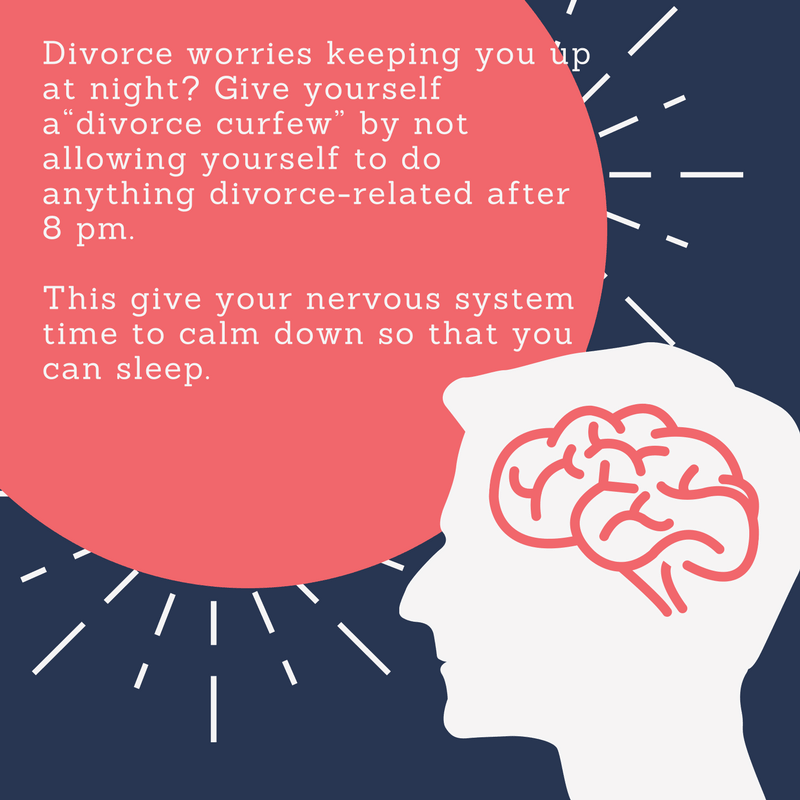How Do I Manage My Anxiety Disorder During Divorce?

If you’re a worrier by nature, you may wonder how you’ll manage your anxiety during one of the most stressful events anyone could face: divorce. How will you survive financially? What if you and your ex can’t agree on custody? Will you be alone the rest of your life? Read on to learn how Alex, a 37-year-old health club owner, managed his anxiety disorder during divorce.
Alex Was Always Prepared For The Worst
Diagnosed with Generalized Anxiety Disorder (GAD) as a teen, Alex was worried about many things most of the time. As is typical of people with anxiety, Alex’s mind seemed more comfortable latching onto a bad outcome – at least he would know what to prepare for — instead of drifting in uncertainty, wondering when the other shoe would drop.
Pre-divorce, Alex had learned to manage his anxiety with a regimen of medication, proper diet, and regular exercise. He also adhered to a structured daily schedule of set work hours, family activities, and bedtimes. As long as he felt in control, he could distract himself from the incessant chorus of “what-ifs?” in his head.
The Divorce Alex Didn’t Plan For
Alex’s carefully structured universe imploded one evening, when his wife Jane announced that she was leaving him for another woman and handed him divorce papers. In the weeks that followed, Alex’s anxiety mushroomed. Unable to sleep, he stayed up all night imagining worst-case divorce scenarios: what if Jane tried to get full custody of their two kids? What if his legal fees got so high that he had to liquidate his retirement account? Could they afford to keep the kids in private school?
Alex struggled to adjust to the couple’s temporary custody order. He was used to seeing the kids (Isabelle, 5, and Lucas, 8) everyday and felt unmoored spending days apart from them. He wondered what they were doing when they were with Jane and started interrogating the kids: Were they spending time with the new girlfriend? Was Jane getting them to bed on time? Was she overseeing their homework properly? The kids told Jane Alex was questioning them and Jane accused Alex of trying to turn them against her.
Their co-parenting relationship shifted from amicable to contentious as Jane and Alex duked it out in daily nasty emails, each blaming the other for problems in the divorce. The situation got so out of hand that Alex started having panic attacks when an email from Jane showed up in his inbox.
Alex’s Attorney Tells Him He Needs Help
When he complained to his attorney, Sylvia, about her legal fees, she told him that he ran up his bill venting about Jane in her office, or via phone calls and emails. She told him that she wasn’t trained to deal with his emotional issues and referred him to a therapist who specialized in helping people through divorce.
Alex’s clinician, Jill, devised a treatment plan to help him manage his anxiety. She told him he needed to shift his focus from obsessing about what might happen (“future-tripping”) to things he could control: his sleeping and eating habits, his cognitive distortions, and his communication with Jane.
- Jill gave Alex a “divorce curfew:” he was not allowed to do anything divorce-related after 8 pm. That way his nervous system would have a chance to calm down so that he could sleep.
- Because Alex was often too overwhelmed to prepare meals, Jill instructed him to eat nutritious snacks (vegetables and proteins) several times a day to help regulate his blood sugar so he could think clearly.
- Although Alex was trying to quell his anxiety by getting Jane to listen to him, his dysfunctional communication style caused more conflict that then made him more anxious. Jill told him he needed to limit his correspondence with Jane to one time a day and that texts and emails could contain only facts: no opinions, no ultimatums, no “constructive advice.”
- Jill helped Alex add more coping skills to his toolbox. Exercise, his go-to stress-buster, was great, but it wasn’t always possible to work out whenever his anxiety spiked. Jill taught Alex mindfulness techniques he could practice any time, any place. She also instructed him to write down every fear he had about the divorce on a separate slip of paper and put it in a box. After this, he was to list three things he was grateful for in a gratitude journal. That way, he could practice letting go of things that might go wrong and focus on what was going right.
Alex’s Positive Outcome
After three months of following his anxiety treatment plan, Alex noticed positive changes in his life. With improved sleep and appetite, Alex was able to function better during the day. Because he had tools to manage his anxiety, he stopped venting to his attorney (thereby reducing his legal bills, another source of anxiety) and compulsively emailing Jane. As the conflict between them subsided, Alex stopped having panic attacks when he had to communicate with Jane. And now that their parents were calmer, the kids’ sense of safety increased and transitions went smoother.
Although Alex didn’t get exactly the financial and custody settlement he’d hoped for (few divorced people do), he was better equipped to navigate the changes that divorce brings.
Have questions about your divorce? Want to explore lower-conflict, lower-stress ways to resolve your issues and move on? We can help. Please contact us today to schedule an initial consultation with one of our compassionate family law attorneys. Secure your peace of mind. Call us today at 888-888-0919, or click the button below:
Schedule an Initial Consultation



